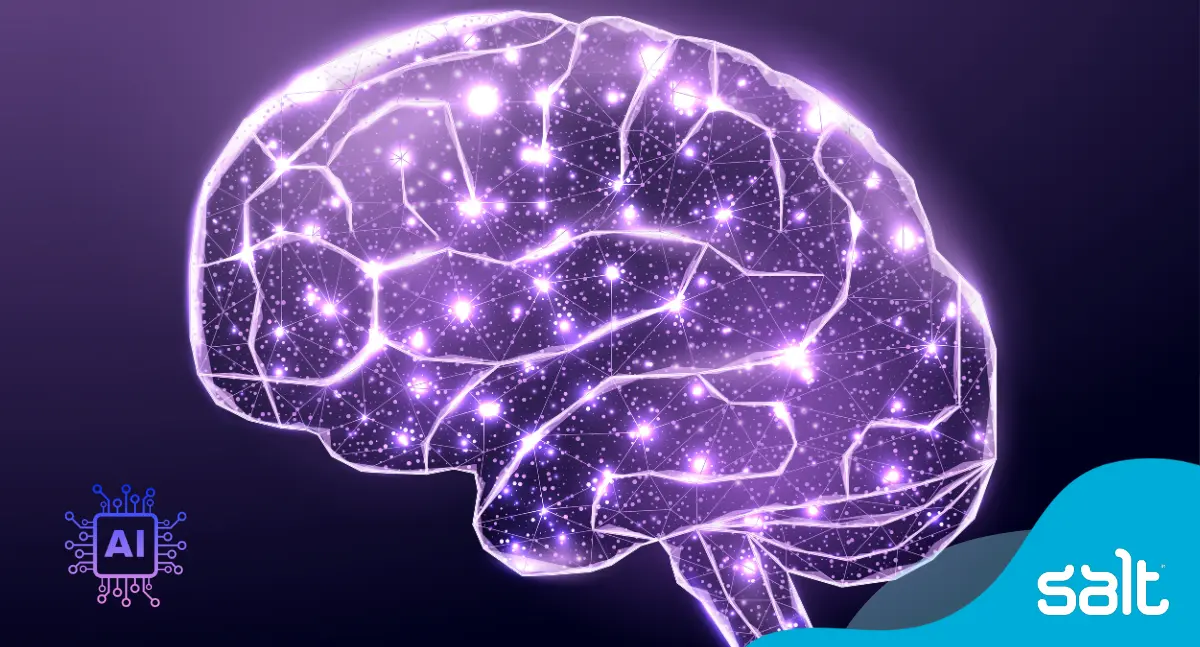
With Artificial Intelligence (AI) becoming more of a global force in the workplace, we’re firmly situated in the Fourth Industrial Revolution (also referred to as Industry 4.0), where digital technologies intertwine with traditional industries. In a departure from the industrial revolutions that have gone before us, this 21st-century revolution is digital.
For the future of work, emerging technologies are all about improvement. The workplace is already being fundamentally changed by Fourth Industrial Revolution technologies including artificial intelligence (AI), the Internet of Things (IoT), Web3, blockchain, augmented reality (AR), virtual reality (VR), machine learning, and automation. When effectively implemented, AI, in particular, can simplify data analysis and refine process management to boost productivity and efficiency.
This guide explores some of the technologies, skills, and roles needed for navigating the realm of AI in the modern workplace.
The fundamentals of AI
Artificial intelligence (AI) is no longer just a concept confined to the small screen in a sci-fi movie; it has become a reality shaping life as we know it. AI as a term and technology has been around for many decades; first coined in the 1950s, it became more widely known when ChatGPT arrived on the scene in 2022, becoming the fastest-growing consumer internet app of all time.
New technologies are changing our roles and everyday work. As AI evolves, many believe it will lead to millions of jobs becoming automated or job redundant. While Britannica defines artificial intelligence as “the ability of a digital computer or computer-controlled robot to perform tasks commonly associated with intelligent beings”, research conducted by McKinsey & Company finds that AI and other Fourth Industrial Revolution technologies will result in three possible outcomes: these technologies will either carry out more of the tasks done by humans, complement the work that humans do, or perform some tasks that go beyond what humans can do. As a result, we foresee that while some occupations will decline, others will grow, and many more will evolve.
The challenge to understanding AI and its impact is its hype. Gartner reports that business leaders tend to overestimate the impact of AI, and data and analytics leaders should establish realistic expectations of AI’s effects to prevent costly project failures.
Businesses require knowledgeable, curious, future-focused data and analytics teams cemented within their organisations to demystify and focus on the problems AI and other Fourth Industrial Revolution technologies will solve.
AI-skilled roles in data and analytics teams
In today’s data-driven business environment, roles within data and analytics teams are rapidly evolving to incorporate emerging digital skills like automation and AI expertise, for example:
- AI Analytics Experts: Leveraging AI for deep data analysis to guide decision-making.
- AI Engineers: Building and implementing machine learning models to uncover insights.
- AI Analysts: Applying AI solutions for predictive analytics and business optimisation.
- AI Architects: Designing infrastructure for AI applications, from data pipelines to model deployment.
- Senior Managers of Analytics and AI: Aligning AI strategies with organisational goals.
- AI Practice Leads: Steering AI teams towards innovative project methodologies.
- AI Managers: EnsuringAI project success through leadership and resource management.
Beyond these core roles, specialised positions such as AI Network Engineers, Product Managers for AI, and AI Researchers are becoming increasingly vital for advancing AI technology and its application in business.
The role of a Chief AI officer is also in the news, with reports suggesting the number of companies hiring a Head of AI has nearly tripled globally in the past five years. But Gartner also suggest that businesses don’t rush to appoint their Chief AI officer – but to consider first who in the busines is responsible and the skills required to for both technological advancement and leadership. In many organisations a dedicated AI team member might not be the first approach, but looking at the skills in your current teams, whether that is marketing, creative, sales or technology and considering the impact across departments.
Looking to hire AI or Data specialists? Contact our recruitment teams today
AU | BE | CA | DE | HK | MY | ME | NL | NZ | SG | SA | UK | USA
How ready is your business for an AI strategy?
Salt’s roundtable with AI and data experts showed that AI adoption in the workplace is really no different to adopting the cloud. It’s how you help organisations to start changing to do this. Fundamentally it’s still about having the right people in situ to enable the data and technology to drive real change.”
Salt’s Analytics and Data Science Recruitment team
Before exploring how AI is transforming organisations and roles, here are some actions business leaders can take, starting with an all-important assessment of your company’s internal readiness for AI.
- Examine your business’s problems to determine which could be addressed through AI solutions. This knowledge will help you find the right ways to use AI effectively in different situations.
- Identify the skills needed in your business to realise your AI ambitions. Finding skill gaps early is crucial for strategically developing or obtaining the necessary talent to support your AI goals.
- Leverage your existing data to benchmark impact improvements before making your technology choice. Before selecting an AI technology, establish clear performance metrics to measure future success.
- Strategically structure your organisation, departments, and teams to develop your AI expertise. Create a suitable environment for teams to work together and innovate in alignment with your business strategy.
- Prioritise upskilling and reskilling. Training your employees helps close skill gaps and prepares them for technological changes. Investing in people is just as crucial as investing in technology.
- Collaborate with specialist technology recruitment agencies like Salt to support you in identifying the right skills and roles necessary to build your AI team.
The must-know technical sales trends by Salt: Globally 68% of business leaders say AI and automation tools are already important to their overall business strategy. Read the full article here.
Three industries where AI is enhancing workplace capabilities
AI can help workers solve problems faster while enhancing their skills. However, there are other solutions for boosting productivity in the workplace, and different workplaces likely require different technologies to improve efficiency. To create an actionable AI strategy, you must understand your department’s individual goals and employees’ skills to determine which department would benefit most.
It is also important to note that these departments may already use AI to enhance their work. A report from Business Insider found that over 40% of people use AI for work tasks, but nearly 70% have not told their boss.
“While most employers (92%) believe their IT departments will be the biggest beneficiary of AI, they also believe other departments, from sales and marketing (85%) to human resources (78%), will derive significant value from it as well.” AWS report, Amazon. Link here
AI assistants for retail and Ecommerce
IBM Watson is an excellent example of advanced business AI. While many businesses have recently adopted AI technology to leverage the technology’s machine-learning skills, IBM’s research into AI goes back to the 1950s. Furthermore, it has constantly evolved, with AI Assist launching in 2020.
IBM’s partnership with The Stikets Company, S.L, a global adhesive solutions company, resulted in Stiky, an AI virtual assistant. Stiky handles up to 80% of global customer enquiries – approximately 165 daily conversations – and boasts a 92% satisfaction rating.
AI skills are growing in the retail industry, specifically in Software Engineering, Data Science and Data Analytics (LinkedIn Insights).
AI and data intelligence for sustainability
AI and sustainability are coming together to drive alignment with organisations’ environmental, social, and governance (ESG) requirements, being deployed to analyse data, identify trends, and predict future behaviour. Supported by technological advancements, data-led insights and a pool of highly skilled AI and data talent, AI tools can ensure regulatory compliance and set future frameworks for sustainability reporting.
Within the “environmental services” industry classification, AI skills are increasingly crucial for System Engineers, Software Engineers, and Technology Analysts roles (LinkedIn Insights).
AI and Cyber Security for IT
For a long time, cyber security risks and cybercrime have been top concerns for the leaders of some of the world’s largest organisations. Today, Generative AI advocates are hailing a new era, where AI will help us outpace the criminals of the dark web.
Security specialists have been using AI for many years to detect and manage vulnerabilities in our technology systems, but Generative AI will help take this to the next level.
Under the “IT” function classification, the most considerable AI skills requirements are identified for Data Analysts, Data Engineers, and CTOs. (LinkedIn Insights).
See Salt’s open Technology jobs around the world!
AU | BE | CA | HK | MY | ME | NL | NZ | SG | SA | UK | USA
As AI technologies continue to advance, understanding the impact on employee skills and processes is the first step in building the future workforce and realising the future of work. While there is a focus on Industry 4.0 as a pivotal revolution guiding business strategies, there’s a notable shift underway. With the advent of Industry 5.0, the application of the technologies that were developed for industry is extending to all sectors and organisations.
Artificial intelligence and other technologies will drive productivity, efficiency, and innovation, but we must understand the specific roles and skills needed to ensure successful implementation in our organisations. Embracing AI and investing in the right talent and technology will transform businesses and pave the way for a future where human intelligence collaborates seamlessly with artificial intelligence to achieve remarkable outcomes.
Hiring? Salt connects you to outstanding top talent worldwide
If you’re interested in hearing about how Salt’s top talent recruitment experts around the world can help with your hiring right now, get in touch. Click below to contact the closest Salt team to you!
- Australia
- Canada
- Belgium
- Europe
- Hong Kong
- Malaysia
- Middle East and North Africa
- Netherlands
- New Zealand
- Singapore
- South Africa
- United Kingdom
- United States
Keep up with Salt’s top talent job market insights and hiring advice! You can keep in the loop by following us on. LinkedIn, YouTube, Facebook, Instagram, and Spotify.


